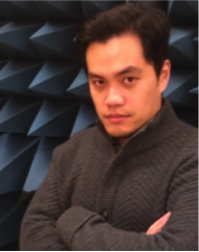
Solid-State and Nano Seminar
Ultrasensitive and Non-Invasive Graphene Nanobiosensors
Add to Google Calendar

Webpage: http://pychen.eng.wayne.edu
E-mail: [email protected]
Graphene is a flat, two-dimensional monolayer of carbon atoms predicted to display a rich variety of electronic, photonics, and biochemical behaviors, as it is a unique gapless semiconductor that exhibits the biochemically-sensitive and field-effect-controlled conductivity, as well as the photoexcited plasmon gain. In my talk, I will give an overview of our recent research progress in graphene-based photonics, optoelectronics, and bioelectronics. First, I will discuss how the gate-tunable surface plasmon polaritons in graphene may enable the real-time, noninvasive biosensing in relatively unexploited THz to infrared regimes. Then, I will present the parity-time (PT) symmetric THz systems based on the photopumped graphene metasurfaces, which show not only the interesting reciprocal and unidirectional scattering, but also the singularity-enhanced sensing of molecular and chemical agents. Finally, I will present a novel all-graphene harmonic sensor that consists of a chemically-reconfigurable RF mixer formed by graphene transistors and a transparent graphene antenna, paving the way towards low-noise, transparent, and flexible wireless sensors, such as smart contact lenses for healthcare IoTs.
Dr. Pai-Yen Chen is an Assistant Professor in the Department of Electrical and Computer Engineering at the Wayne State University. He received his Ph.D. degree from the University of Texas at Austin in 2013. He was a Research Scientist at the Intellectual Ventures' Metamaterial Commercialization Center during 2013-2014, and a Research Staff in the National Nano Device Laboratory in Taiwan during 2006-2009. He has been involved in multidisciplinary research on applied electromagnetics, plasmonics, nanophotonics, and their applications in biomedical engineering. He has published approximately 62 peer-review papers (including Nature, NPG journals, Physical Review Letter, Nano Letters, ACS Nano, Advanced Materials, and several journal covers), 58 conference proceedings, 1 book, 4 book chapters, and 9 US patents. He has served as TPC members and session chairs for several international symposia and conferences. He also received several awards, national fellowships, and best student papers in major conferences.
 MENU
MENU 
